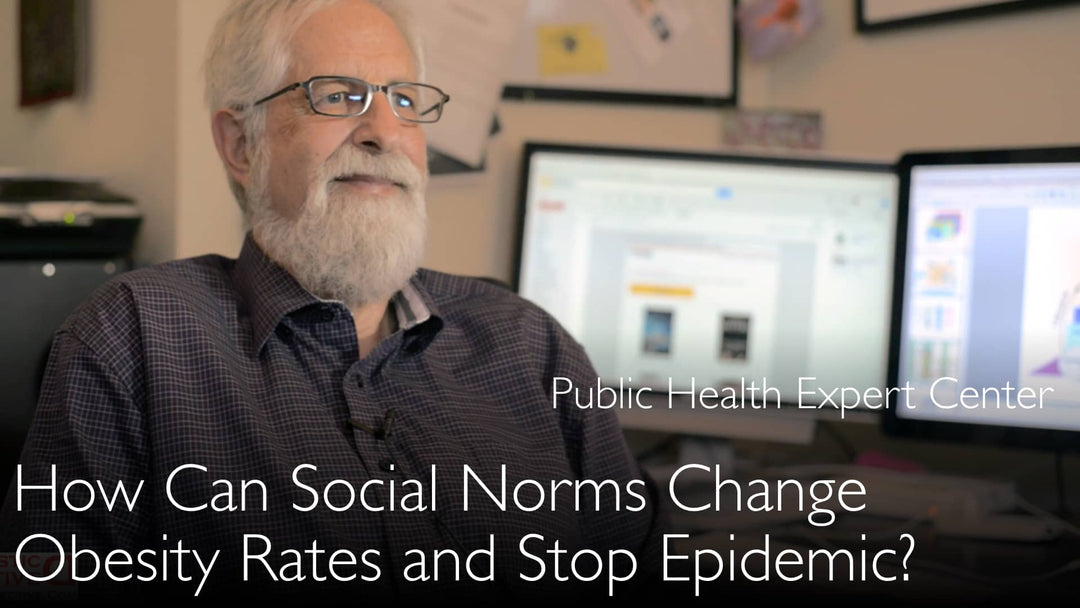מומחה מוביל בגורמים החברתיים של בריאות, ד"ר ג'ורג' קפלן, MD, מסביר כיצד נורמות חברתיות ולחצים חברתיים יכולים להילחם במגפת ההשמנה על ידי עיצוב מחדש של סביבות מזון, גדלי מנות, ותשתיות שכונתיות. הוא מדגיש שהשמנה היא נושא מורכב הדורש התערבויות רב-רבדיות, לא פתרונות קסם, ומציג נתוני הדמיה המראים כי פערים גזעיים במדד מסת הגוף (BMI) יכולים להיעלם בתוך 20 שנים באמצעות שיפורים סוציו-אקונומיים ממוקדים.
כיצד נורמות חברתיות ושינויים חברתיים יכולים להפוך את מגפת ההשמנה
קפיצה לפרק
- נורמות חברתיות ומניעת השמנה
- גודל מנות וסביבת המזון
- חיי עבודה והרגלי אכילה
- איכות המזון והתזונה
- מורכבות הגורמים להשמנה
- פתרונות סוציו-אקונומיים לפערי BMI
- גישה חברתית ארוכת טווח
נורמות חברתיות ומניעת השמנה
לנורמות חברתיות תפקיד חשוב ביותר בעיצוב התנהגויות בריאות ובמאבק בהשמנה, לפי ד"ר ג'ורג' קפלן. שינוי נורמות אלה קשה אך אפשרי, כפי שהודגם בשינוי המוצלח של העישון מהתנהגות מקובלת לבלתי מקובלת בקהילות רבות. ד"ר ג'ורג' קפלן מציין שבעוד שהטבק עלול להיות ממכר מאוד, האתגר של ירידה במשקל דורש התייחסות לגורמים חברתיים וסביבתיים מושרשים.
גודל מנות וסביבת המזון
ד"ר ג'ורג' קפלן מזהה את גודל המנה כנורמה חברתית קריטית המשפיעה ישירות על שיעורי ההשמנה. מחקרים מראים שאנשים צורכים אחוז מסוים ממה שמוגש בפניהם, בין אם על צלחות גדולות או קטנות. הריאיון עם ד"ר אנטון טיטוב הדגיש כיצד גדלי המנות האמריקאיות גדולות משמעותית מהסטנדרטים האירופיים, ותורמות לצריכת קלוריות מוגזמת. מנות במסעדות המיועדות למספר אנשים מעודדות אכילת יתר באמצעות רמזים סביבתיים ולא אותות רעב.
חיי עבודה והרגלי אכילה
איזון עבודה-חיים מודרני ודינמיקות משפחתיות משפיעים significativamente על דפוסי האכילה וסיכון להשמנה. ד"ר ג'ורג' קפלן מסביר שמגבלות זמן גורמות לאנשים רבים לאכול alone או להסתמך על מזון מהיר because they lack time for meal preparation. הנוחות והמחיר הנמוך של מזונות מעובדים יוצרים נורמות חברתיות שמעדיפות מהירות על פני תזונה. דפוסים התנהגותיים אלה הופכים מושרשים through daily repetition and social acceptance of fast food culture.
איכות המזון והתזונה
שינוי נורמות חברתיות לכיוון תזונה איכותית יותר מהווה אסטרטגיה נוספת למניעת השמנה. ד"ר ג'ורג' קפלן מציע שהחלפת מזונות מזינים המיוצרים locally באפשרויות קפואות או ארוזות מראש could significantly impact public health. השיחה עם ד"ר אנטון טיטוב הדגישה שהתערבויות באיכות המזון must address both availability and social acceptance of healthier alternatives within communities.
מורכבות הגורמים להשמנה
השמנה היא מצב (diagnosis) מורכב ביותר עם מאות גורמים תורמים, כפי שתועד על ידי קבוצת Foresight בבריטניה. תרגיל המיפוי שלהם חשף השפעות ranging from psychological to biological factors and food production systems. ד"ר קפלן מדגיש that no single intervention—whether eliminating high fructose corn syrup or targeting specific macronutrients—will solve the obesity epidemic alone. מורכבות זו דורשת גישות מקיפות ורב-ממדיות.
פתרונות סוציו-אקונומיים לפערי BMI
מודלים סימולציה מראים פוטנציאל דרמטי להפחתת פערים גזעיים במדד מסת הגוף (BMI) through socioeconomic interventions. ד"ר ג'ורג' קפלן מדווח that BMI differences between black and white populations could be dramatically lessened or even eliminated within 20 years—approximately one generation. התערבויות מפתח include improving neighborhood walkability, increasing availability of healthy food options, and enhancing educational quality. ממצאים these underscore that societal factors outweigh individual diet approaches for population-level impact.
גישה חברתית ארוכת טווח
מגפת ההשמנה developed over decades and will require sustained, long-term societal changes rather than quick fixes. ד"ר ג'ורג' קפלן emphasizes that the most significant impact will come from addressing fundamental socioeconomic factors rather than searching for magic pills or miracle diets. As ד"ר אנטון טיטוב discussed with ד"ר ג'ורג' קפלן, this approach recognizes that environmental and social restructuring creates the foundation for lasting health behavior change across populations.
תמלול מלא
ד"ר אנטון טיטוב: What do you think is the role of social pressures to affect changes in health habits in general and obesity in particular? And what's the effective way to use social pressure factors in changing public behavior?
ד"ר ג'ורג' קפלן: Social norms are extraordinarily important, but they're also difficult to change. We saw that with smoking—it took a lot to make smoking unacceptable behavior. In the area where I live in Northern California, there are still areas where it is the norm.
People have argued that tobacco is more addictive than heroin. That may be the case; I don't know if it is or not, but certainly it's enormously addictive. And losing weight is extremely difficult.
The social norms and pressures we have to work on are those that have to do with portion size. Going into a restaurant and being served food for two people—the evidence shows that people tend to consume a certain percentage of what's put in front of them, whether it's a large plate or a small plate. If they put a big plate in, they eat more.
Portions in the United States are so much larger than in Europe. That's right. We also have to think about how work life and family life lead to eating alone or eating fast food because you don't have time to prepare food, or because it's cheap—how that contributes to obesity.
We have to think about norms that have to do with the quality of food, substituting perhaps locally produced, nutritious food for frozen or prepackaged food. There's a whole variety of things; obesity is enormously complex.
The Foresight Group in the United Kingdom did a map of all the factors that contribute to obesity, ranging from the psychological to the food production side, the biological side. There are hundreds of factors that contribute.
There's not going to be any magic thing. We're not going to be able to eliminate obesity, in my opinion, by eliminating high fructose corn syrup or by somehow intervening on carbohydrates or this or that. I don't think any single thing is going to do it.
These problems developed over a long period; they'll take a long time to reduce. We did show in a simulation model that we have that the body mass index difference between blacks and whites could be dramatically lessened, perhaps even eliminated in less than 20 years—one generation.
By intervening on the walkability of the neighborhoods in which people live, by the availability of good food, and by increasing the quality of education, in that simulation model—which is a model, not an intervention—we were able to eliminate BMI differences between blacks and whites in 20 years.
So that's another underscoring of the importance of socioeconomic factors rather than trying to look for a magic pill or a major diet on an individual level. It is the societal factors that will make the most impact on such enormous problems.
ד"ר אנטון טיטוב: Absolutely. Thank you very much for this conversation.
ד"ר ג'ורג' קפלן: Thank you.





